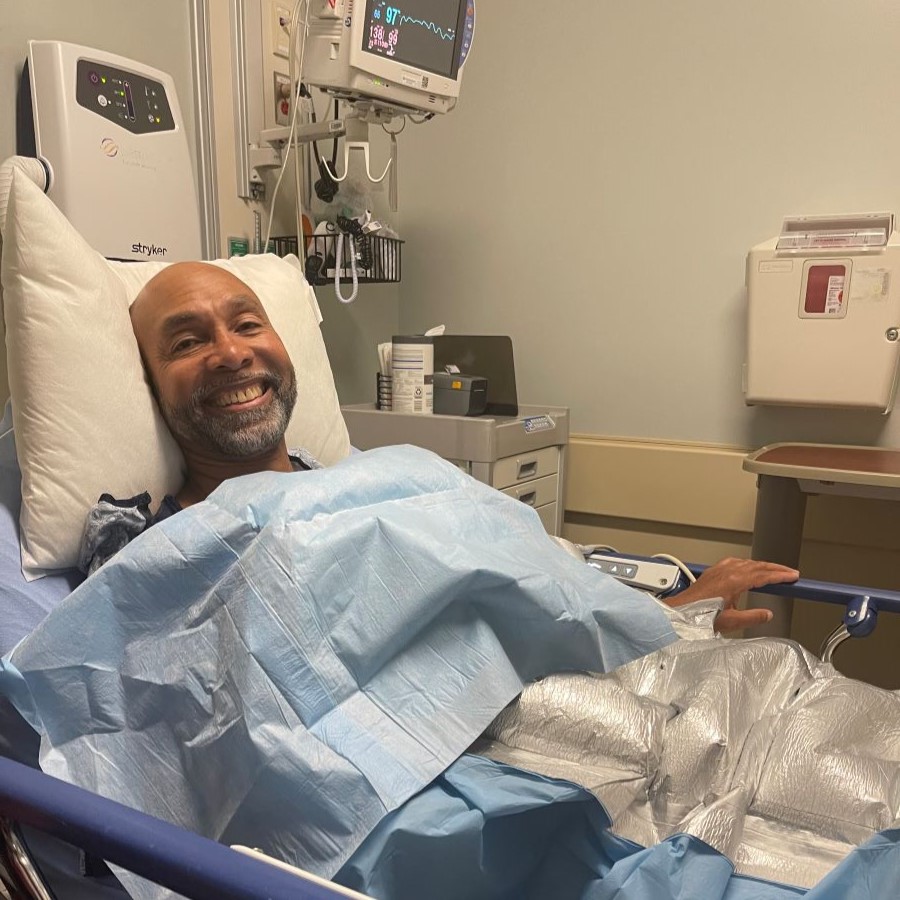
Ronald Wakefield of Roswell began his prostate cancer journey after a routine checkup in October 2022. At 64, Ronald had been seeing his primary care physician for nearly two decades and trusted him fully, including his recommendation to opt for the prostate-specific antigen (PSA) test over the digital rectal exam, based on updated screening guidelines.
“I was given the choice to complete both options, but I opted to only complete the PSA screening,” Ronald said. “I returned for the follow-up appointment to discover that my PSA levels were elevated.”
Ronald was then referred to urologist Dr. Lewis Kriteman. “At the initial visit, Dr. Kriteman prescribed a round of antibiotics to see if my PSA score would go down,” he explained.
However, a follow-up PSA test revealed no progress. Additional testing, including a CT scan in January 2023 and a biopsy in April, followed. "The waiting seemed to be the hardest," Ronald said.
When the biopsy results came in, Ronald and his wife, Gladys, went together to hear the diagnosis: prostate cancer.
Dr. Kriteman shared that Ronald had two options: surgery or radiation. He referred Ronald to radiation oncologist Dr. Hamilton Williams and robotic surgeon Dr. Daniel Belew to learn more and determine what was best for him.
Ultimately, Ronald chose surgery. “I felt that if the cancer came back, radiation would be an option, but surgery wouldn’t,” he said. “So, we felt it was better to do surgery now.”

On July 3, 2023, Ronald underwent a radical prostatectomy performed by Dr. Belew. Although the surgery went well, Ronald was surprised by some of the side effects.
"I had no issues from the surgery or concerns; however, I was shocked by the level of bladder incontinence,” he said. “I was thankful for the resources Dr. Belew lined me up with following my surgery.”
Ronald had access to an oncology nurse navigator, Jeannie Reakirt, who regularly checked in on him. He also participated in men’s pelvic floor rehabilitation, which provided exercises like Kegels to help with incontinence.
“I still do Kegels daily. I strongly recommend them,” he said.
In addition to incontinence, Ronald experienced sexual dysfunction.
“There are various options for treatment; I chose medication,” he said. “In my case, it will take time, but my doctor is very hopeful and positive about my full recovery.”
Despite these challenges, Ronald has seen significant improvements.
“I used to go to the bathroom every hour and now have had great improvements, even at night. I am very close to being back to normal.”
Ronald credits much of his recovery to his support system, especially his wife.
“The unique piece to my story is that my wife, 10 years ago, had her journey with cancer, and I was her caregiver,” he said. “Now, there is a role reversal, and she was able to lovingly walk alongside me.”
The couple, married for 40 years, celebrated with family and friends a few weeks after Ronald’s surgery.
“This was my first outing with family and friends since my journey, which made it even more special,” he said.
Ronald also received support from his workplace.
“I informed my fellow executive leadership team at work and my direct reports that I was diagnosed with cancer and would need to take some time off. I felt supported,” he said. He even connected with a coworker who was 18 months ahead of him in his prostate cancer treatment.
“He became a mentor and shared his experience with the surgery and outcome.”
Faith and his church community were another pillar of support.
“I’m a Christian, and my church was very supportive,” Ronald said. “They prayed with me, kept in touch, and provided love not just to me, but my entire family.”
Today, Ronald is almost fully recovered and reflects on his journey with a positive outlook.
“I go back in December for a follow-up. In the meantime, I’m physically active and back in the gym two to three times a week.”
He emphasizes the importance of patience and a strong support system.
“All of it takes time. Be patient and go through the process. Have a support system be comfortable talking about it to others and be open to learning from others.”
Finally, Ronald encourages regular checkups and screenings.
"I tell everyone to go get their physicals along with your bloodwork and any other recommended tests,” he said. “Men often avoid surgery because they fear it will affect their ability to have sex. But with advances in science, they shouldn’t be so hesitant.”
Learn more about prostate cancer care at Northside Hospital Cancer Institute.
*The health story shared here is for informational purposes only and is not medical advice. Patients should consult with their own physician before making medical decisions.
